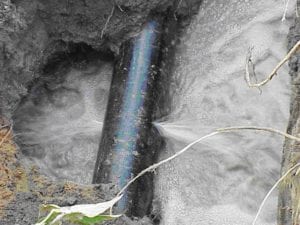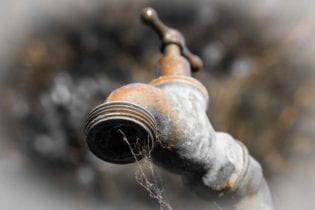
Leaking water pipe
The summit, which is currently underway in Johannesburg, brings together water experts to discuss the region’s water situation.
Intermittent water supply – the practice of cutting off water supply to an area at certain times of the day – has been implemented in several countries across the world and has recently been introduced in South Africa in response to the ongoing drought. Opening the summit, Tim Waldron, former chairperson of the IWA, stated that intermittent supply “invariably has disastrous outcomes. It has proved a disaster everywhere they’ve done it.”
Taking a relatively steady hydraulic situation and changing it to one that fluctuates every day results in a more fragile system, explained Waldron. While intermittent supply is usually implemented to save water, it invariable creates more leaks and opens up the opportunity for water to become contaminated.
The dangers of intermittent supply
Turning the water pressure off will often fill with air, which must escape once the pressure is turned back on. If the air valves are not functional, as is often the case, this can create new pipe leaks or even cause pipe bursts.
Furthermore, the refilling spike that can be observed when the system is initially repressurised can damage water meters.
In addition to this, if the system is depressurised, the potential arises for the surrounding groundwater to enter the supply through any leaks in the system. If the groundwater is contaminated, the water supply may become contaminated where there is insufficient chlorine to eliminate contaminants. This can result in water-borne diseases such as cholera and typhoid.
Dr McKeznie pointed to studies which show that intermittent supply actually results in very little water saving and highlighted that it could in fact increase costs because of the damage it can cause.
“Do not go down that path [of intermittent supply], avoid it at all costs. It can be disastrous in terms of the cost and health consequence,” concluded Waldron.







